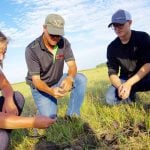Beekeepers in Alberta do not support a hard-line stance against insecticides and are concerned about legal action against the crop protection industry in Ontario.
Earlier this month, two honey producers in Ontario filed a class action against Syngenta and Bayer Crop Science, on behalf of the province’s beekeeping industry.
Sun Parlor Honey Ltd. and Munro Honey are claiming that neonicotinoids, which are applied as seed treatments to the majority of corn, canola and soybean crops in North America, have caused bee deaths, impaired reproduction, hive loss, reduced honey production, loss of queen bees and compromised honey quality.
Read Also

U.S. grains: soybeans firm ahead of USDA data
Chicago soybeans ticked up slightly on Wednesday as traders adjusted positions ahead of the release of official U.S. data on global supply and demand on Friday, the first update in weeks, but prices were capped by a lack of large Chinese purchases.
The class action is claiming $450 million in damages to the Ontario’s bee industry. The beekeepers are seeking compensation for financial losses dating back to 2006.
In a statement issued yesterday, the Alberta Beekeepers Commission said it does not support the class action suit.
“The Alberta Beekeepers Commission recognizes that the use of certain agro chemicals can adversely affect honeybees, but also recognizes the benefits of using seed treatment technology in agriculture. In particular, compared to the organophosphates and foliar applications of pesticides previously used, seed treatment technology significantly reduces honeybee exposure to pesticides.”
The Alberta beekeepers’ statement is evidence of a rift between apiarists in Western Canada and beekeepers in Ontario over the issue of neonicotinoids.
The Ontario Beekeepers’ Association didn’t initiate the $450 million lawsuit, but the organization has forcefully lobbied against the use of neonics for several years. The OBA claims seed treatments are a systemic threat to bee colonies and the long-term health of pollinators.
Beekeepers in Western Canada have said they are tired of Ontario beekeepers speaking on behalf of Canada’s honey and pollinator industry.
The Alberta beekeepers said it wants to work with, not against, the crop protection industry to preserve pollinator health.
“We believe that working together with appropriate research, management and education of all stakeholders will ensure that modern agriculture and honeybees can coexist. The Canadian Honey Council and most provincial beekeeping organizations have been working, and will continue working, together with all agricultural stakeholders to ensure that the entire agriculture industry will be sustainable today and into the future.”















